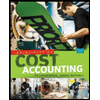Crenshaw Inc. is considering a change to activity-based product costing. The company produces two products, cell phones and tablet PCs, in a single production department. The production department is estimated to require 4,000 direct lab hours. The total indirect labor is budgeted to be $468,000. Time records from indirect labor employees revealed that they spent 40% of their time setting up production runs and 60% of their time supporting actual production. The following information about cell phones and tablet PCs was determined from the corporate records: Direct Labor Hours Cell phones Tablet PCs Total Number of Setups per unit 500 1,100 1,600 2,000 2,000 4,000 If required, round your answers to the nearest cent. . Determine the indirect labor cost per unit allocated to cell phones and tablet PCs under a single plantwide factory overhead rate system using the direct labor hours as the allocation base. Cell phones s per unit ablet PCs Units 60,000 60,000 120,000 per unit . Determine the budgeted activity costs and activity rates for the indirect labor under activity-based costing. Assume two activities-one for setup and the other for production support. Budgeted Activity Cost Activity Rate Setup per setup Production support per direct labor hour Determine the activity cost per unit for indirect labor allocated to each product under activity-based costing. Cell phones s per unit ablet PCs 1. Why are the per-unit allocated costs in (a) different from the per-unit activity cost assigned to the products in (c)? The per-unit indirect labor costs in (a) are distorted because is consumed by the products in a different ratio from the direct labor. The number of setups receiving a larger portion of the setup activity cost. The costing method results in the product with the allocates overhead only on the basis of direct labor hours. Since the direct labor hours equal for
Process Costing
Process costing is a sort of operation costing which is employed to determine the value of a product at each process or stage of producing process, applicable where goods produced from a series of continuous operations or procedure.
Job Costing
Job costing is adhesive costs of each and every job involved in the production processes. It is an accounting measure. It is a method which determines the cost of specific jobs, which are performed according to the consumer’s specifications. Job costing is possible only in businesses where the production is done as per the customer’s requirement. For example, some customers order to manufacture furniture as per their needs.
ABC Costing
Cost Accounting is a form of managerial accounting that helps the company in assessing the total variable cost so as to compute the cost of production. Cost accounting is generally used by the management so as to ensure better decision-making. In comparison to financial accounting, cost accounting has to follow a set standard ad can be used flexibly by the management as per their needs. The types of Cost Accounting include – Lean Accounting, Standard Costing, Marginal Costing and Activity Based Costing.

Trending now
This is a popular solution!
Step by step
Solved in 5 steps









